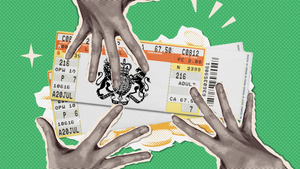The UK government has formally opened its consultation on the ticketing business, seeking input on possible new regulation of the ticket resale market, including the planned price cap on touted tickets announced by Prime Minister Keir Starmer before last year’s General Election.
Developments in primary ticketing are also set to be reviewed, in particular the use of dynamic pricing, which proved so controversial when tickets went on sale for the Oasis reunion last year.
Announcing the consultation, Business Secretary Jonathan Reynolds says, “From sports tournaments to Taylor Swift, all too often big events have been dogged by consumers being taken advantage of by ticket touts”.
Those touts, he adds, too often employ “unfair practices” that “look to fleece people of their hard-earned income, which isn’t fair on fans, venues and artists”. To that end, the government plans to put ticket buyers “back in control”.
The music industry has been calling for tighter regulation of ticket resale for years, in particular via the FanFair Alliance. According to Adam Webb, FanFair's Campaign Manager, the measures being considered in the new consultation “are potentially game-changing”.
Other countries, he adds, “have demonstrated how legislation to prevent the resale of tickets for profit can massively curb the illegal and anti-consumer practices of online ticket touts and offshore resale platforms. The UK simply needs to follow their example”.
The price cap would restrict how much a touted ticket could be marked up from the face value of that ticket on primary ticketing sites.
The government cites analysis from the Competition & Markets Authority that “typical mark-ups on tickets sold on the secondary market are more than 50%”, while “investigations by Trading Standards have uncovered evidence of tickets being resold for up to six times their original cost”.
The rationale for the price cap is that people who buy tickets intending to go to a show but then can’t attend for some reason can still resell their tickets, but commercial touts are restricted in how much they can profit by buying up tickets to in-demand shows and then reselling them on resale platforms like StubHub or Viagogo.
Indeed, depending on the level of the price cap, it potentially makes commercial ticket touting unviable, reducing the number of touts hoovering up tickets when they go on sale on the primary sites.
When Starmer announced the plan to introduce a ticket touting price cap last year he indicated that the cap would be 10% above face value. However, the consultation is seeking input on the impact of a price cap anywhere from 0-30%.
Other measures being considered include limiting the number of tickets any one tout can sell for any one show and increasing the legal obligations of the resale platforms, in particular in relation to the information provided about touted tickets and the touts selling them.
Although the key focus of this consultation is secondary ticketing, the government pledged to also review the use of dynamic pricing on primary ticketing sites following the uproar that surrounded the sale of tickets to Oasis shows last year.
With dynamic pricing, the price of tickets on primary sites goes up and down depending on demand, which means fans can end up paying considerably more for tickets than they initially expected.
The consultation will consider whether practices in the primary ticketing market are “working for fans” and if “the current system provides sufficient protection from unfair practices”. In particular, it will “consider whether there is potential for new harms to consumers to arise from emerging business trends including the use of new technologies and dynamic pricing”.
The consultation has also been welcomed by LIVE, the trade group for the wider live sector. Its CEO Jon Collins says the consultation is a “positive step to put fans back at the heart of live music by tackling ticket touting”. The measures being proposed, he adds, “will reduce the incentive for touts to squeeze fans out of the primary sale and highlights the need to set the cap on resales at or near the original price”.

